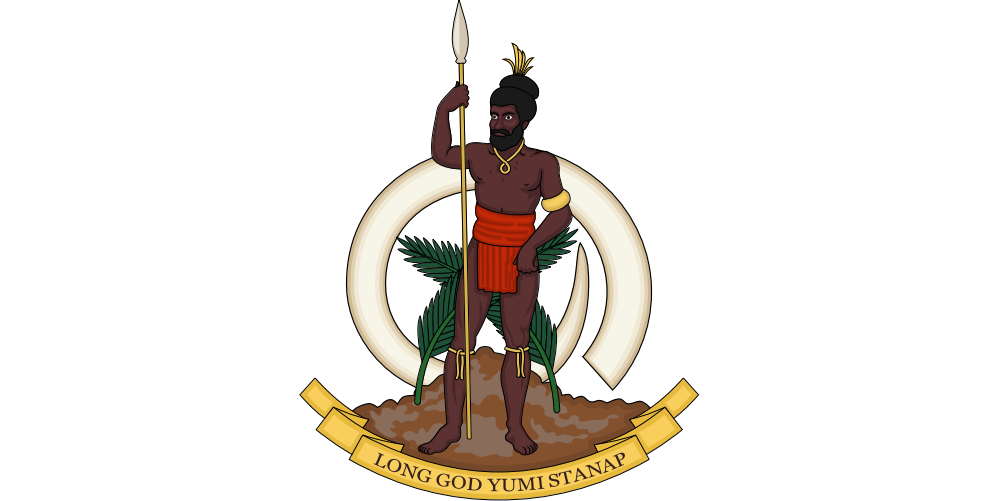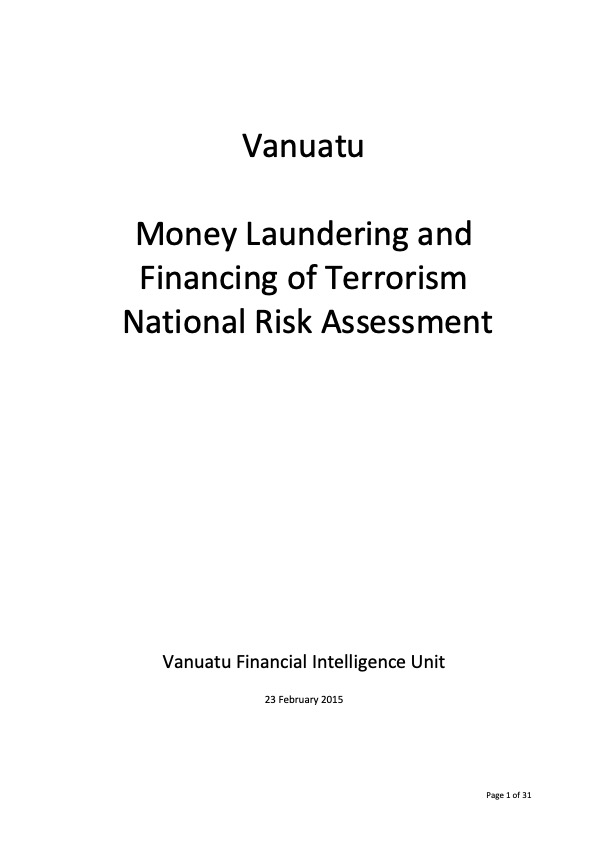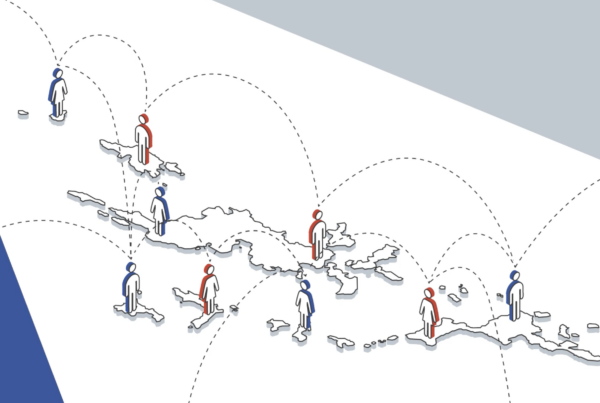Executive Summary
This Vanuatu Money Laundering and Financing of Terrorism National Risk Assessment (“ML/FT NRA”) was conducted between May 2014 and December 2014 on behalf of the Vanuatu Financial Sector Assessment Group, the body responsible for oversight of Vanuatu’s Anti-Money Laundering and Counter-Terrorism Financing (“AML/CFT”) Program. The primary Vanuatu agency responsible for the preparation of the NRA is the Vanuatu Financial Intelligence Unit (“VFIU”), with support from a range of Vanuatu government agencies including the Reserve Bank of Vanuatu, the Vanuatu Financial Services Commission, Vanuatu Police Force, Department of Customs and Inland Revenue, State Law Office and the Public Prosecutor’s office.
This NRA has drawn on the best available data and information obtained through interviews, workshops, from government agencies and financial sector data, other public sources and media reports. This information was used to assess the ML/FT risk in and through Vanuatu using the standard risk management approach of identifying and evaluating the threats, systemic weaknesses and the possible consequences to Vanuatu should those ML/FT risks eventuate.
This NRA has also referenced the Guidance on National Money Laundering and Terrorism Financing Risk Assessments published by the Financial Action Task Force on money laundering (“FATF”) in February 2013, the Asia Pacific Group on money laundering (“APG”) Strategic Implementation Planning (“SIP”) framework for NRAs, and the NRAs of Australia, New Zealand, Singapore and Aruba.
The major money laundering threats to Vanuatu, now and in the short term future, most likely to provide significant amounts of funds to be laundered in and through Vanuatu relate to funds derived from offshore crime, illicit cross border currency, bribery and corruption, fraud (particularly VAT evasion) and drugs.
The movement of funds, both cash and electronic wire transfers that originate from offshore has been identified as a significant concern enabling ML/FT to flourish in and through Vanuatu. Although there is limited information available in Vanuatu on the source of illicit transnational flows of funds into and through Vanuatu, overseas investigations have established that overseas tax evaders have used Vanuatu’s international and domestic financial sector and corporate sectors to move and attempt to hide illicit funds. It is also likely that these sectors are being used for disguising other transnational illicit capital resulting from overseas corruption, drug trafficking and other crimes, and also potentially terrorism financing.
Illicit funds relating to bribery and corruption are high on the list of ML/FT threats. Corruption in the political and government sectors has been acknowledged over many years. Procedures are now being implemented to attempt to curtail corruption, such as through the Ombudsman’s office. It is likely however that a relatively large value of proceeds of corruption are available for laundering domestically.
Experts identified that fraud is also an issue in Vanuatu, especially fraud against the revenue in the form of VAT evasion, which appears to be widespread.
Drug related offences have traditionally been at a very low level in Vanuatu. Domestic use is now seen to be increasing, primarily due to the production and growing of illicit drugs, and recently, some small domestic seizures of imported hard drugs have emerged in the domestic market. In recent years, a small number of investigations have identified Vanuatu as a transhipment point for illicit drugs bound for other countries. It is likely that transhipments of drugs would be associated with illicit capital flows through Vanuatu, at least in small values, such as shore party facilitation payments.
Vanuatu’s relatively diverse and open financial sector creates a number of vulnerabilities which can lead to the escalation of ML/FT. The sectors that are found to be very highly vulnerable to ML/FT are the domestic banks, international (Offshore) banks, company and trust formation providers and the related companies and trusts, money transfer businesses, currency exchange businesses, casinos and interactive gaming and online gambling sites. The sectors that were found to be less, but still highly vulnerable were lawyers and accountants, real estate, and high value asset dealers (particularly boats). Several other sectors were also found to be of moderate or low vulnerability.
Although there has been a high level of cross party political will to ensure that significant legislative reform has recently been carried out in Vanuatu, some of the new legislation has only been amended or enacted in 2014 and it is too early to determine the effectiveness of that legislation. Further amendment and enactments are required to strengthen the AML/CFT program and must be made urgently. The new legislation provides agencies with largely adequate powers to detect and deter ML/FT, however full implementation of those powers is essential and with limited technical and human resources there is a major vulnerability to the effectiveness of the legislation and consequently to minimising the ML/FT risks.
The ML/FT risks posed by the presence of threats made possible by weaknesses in the Vanuatu AML/CFT program is significantly compounded by Vanuatu’s generally low level of capacity, specifically the lack of supervision of the AML/CFT program and the inability to provide financial intelligence, investigation and prosecution of ML/FT offenders.
Vanuatu’s main capacity issues stem from insufficient staff to conduct key AML/CFT roles. A major limiting factor is the size of Vanuatu’s population and consequently the resources available to all of the various agencies in Vanuatu’s AML/CFT program. Ultimately, while there are talented people with good legislative powers and systems, there are not enough people to effectively make use of these advantages. In agencies with other primary core functions, or non- AML/CFT core functions, those non-AML/CFT functions necessarily take priority over the AML/CFT functions to the detriment of Vanuatu’s overall AML/CFT program.
Vanuatu agencies have limited technical resources such as computers and software to assist them in their AML/CFT program. Although the transactional reporting component of the program is very good, limited technologies and expertise do not allow the VFIU an adequate degree of analysis to support the intelligence value of the reports, and consequently ML/FT is less likely to be identified, even though adequate data may be available in the financial transaction reports. Similarly, other agencies also have limited technology availability and skills in the use of technologies.
Border controls are deficient and ineffective in detecting the movement of cash into and out of Vanuatu due to capacity and infrastructure deficiencies, particularly at the seaport. With a large number of cruise ships and other shipping visitations, the limited ability of authorities to ensure that illicit cash and monetary instruments are not being brought into and taken out of the country by “transit” tourists is a major concern.
Limited human resource capacity also results in limited AML/CFT coordination. The formal frameworks, such as MOUs, are largely in place. However, lack of resources, lack of established working groups and siloed roles makes effective coordination difficult. Given the small number of staff available, there is a risk that formal arrangements for coordination are proving onerous to agencies.
A significant portion of the ML/FT risks are borne by the Vanuatu banking sectors with regard to illicit cash and electronic funds. Compounding this risk is the presence of the international banks, although the number of institutions has reduced significantly in recent years. The Reserve Bank of Vanuatu is the highest capacity supervisor which goes some way to mitigate the risk in the banking sectors. Nonetheless, the overall risk to the sector, particularly the risk of transnational laundering through the offshore banking sector remains high.
The presence of the international banks is one aspect of the high level of international exposure in Vanuatu and consequently the risk of ML/FT. Offshore services are also offered by the trusts and company service providers (TCSPs), other professional services, the insurance industry and online gambling. All of these services are facilitated by modern communications and an open economy. While the openness to international funds is a key aspect to Vanuatu’s strategy for economic growth, this openness also creates a higher likelihood of the services being used to facilitate ML/FT through illicit funds flows. Vanuatu’s low level of capacity means that managing these risks is very restricted.
Vulnerabilities within money transfer operators, currency exchange businesses, casinos and high value asset dealers, all create channels for placement and movement of cash proceeds. There is a high level of risk that cash proceeds will be carried into Vanuatu to be layered through these channels. Similarly the risk that proceeds of crime from domestic and overseas offenders will be layered through real estate deals is also particularly high.
Professional services and access to trust and company services compound the high level of risks in the banking and real estate sectors. Both professional services and TCSPs are rated as high risk in their own right. However, the nexus between these high risk sectors creates an overall higher national risk for Vanuatu as both the means of obfuscating illicit transactions and the channels for those transactions are readily available, particularly to the very real transnational threat.
This NRA, the first for Vanuatu, is very broad, outlines the high level of ML/FT risks and is consequently a foundation for the development of a more adequate assessment of ML/FT risk over the next few years. This NRA lacks many of the essential criteria, such as statistical and case materials, for a thorough assessment of ML/FT risk. To develop a more thorough NRA, statistical and other data will need to be collected and analysed, much of it is not currently identified and collected.
Although initial progress has been made by improving technical compliance, ML/FT is not being adequately deterred in Vanuatu. Domestically, the low level of deterrence is likely to lead to the expanding facilitation of ML/FT. Continued non-deterrence of transnational laundering is likely to lead to a loss of international reputation, which in turn threatens international business, impacting economic growth and revenue. A range of mitigating strategies have been identified to address the ML/FT risks. These strategies must be urgently implemented.
(…)






